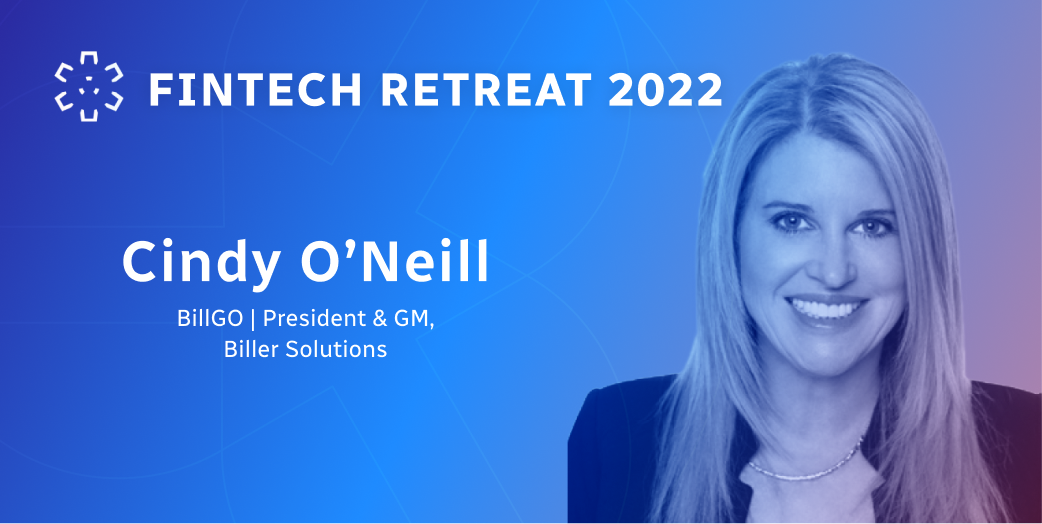Fintech Retreat recently wrapped and it gave executives, investors, entrepreneurs and tech leaders from across the financial services industry an opportunity to participate in a series of exclusive, invitation-only panel discussions that covered an array of topics.
Cindy O’Neill, President/GM of Biller Solutions at BillGO was not only a panelist at the event but also an enthusiastic attendee, which provided her the opportunity to drive the conversation around payments with other leaders in the industry.
We sat down with her to get a quick recap of the event and find out what was on the minds of both the speakers and the attendees.
What were some key takeaways from Fintech Retreat? Any eye-opening moments?
What stood out to me was the number of fintech companies that are making a splash in the industry. It was interesting to learn about new ways technology is being deployed as well as some of the different technology solutions that have been introduced to the market.
In your Payments panel with other fintech leaders, what insights were shared about the future of payments?
The panel was focused on real-time payments, buy now, pay later (BNPL), global innovations, etc, but cryptocurrencies dominated the discussion. Topics around that included regulatory oversight, the use of crypto in traditional payments streams, if and how crypto can be used as collateral for financing and in BNPL scenarios. The subject of crypto was so popular, in fact, some executives at the event suggested crypto could serve as a stand-alone topic at the next Retreat.
What is the number one barrier you see in a wider adoption of crypto in traditional financial services?
The industry has identified security and scalability as barriers to cryptocurrency adoption, but the topic that dominated the discussion was regulations. In particular, the panel posed the question, would the U.S. attempt to regulate with Stablecoin, and if so, what would the adoption rate be as a result? Would this help banks with concerns around anti-money laundering (AML)? And, what are other countries doing with regards to regulations around crypto – some have banned it. The conclusion? To be continued for more air time on a future panel with cryptocurrency as the sole focus.
“Billers are held back by prohibitive cost inefficiencies that continue to manifest themselves in the form of high fees, exception processing, chargebacks and other headaches billers must negotiate.”
You’ve devoted your career to removing the friction associated with payment acceptance. Are we any closer to solving this problem?
There has definitely been an improvement as the industry has remained focused on reducing check spend and identifying value-added solutions for suppliers. However, billers are held back by prohibitive cost inefficiencies that continue to manifest themselves in the form of high fees, exception processing, chargebacks and other headaches billers must negotiate.
Organizations are starting to invest in sophisticated, efficient supplier networks that enable all businesses to take advantage of electronic payments.
Learn how BillGO Exchange is supercharging the way billers of all sizes get paid.
“The key is to continue focusing on the barriers that prevent suppliers from scaling acceptance.”
What is holding businesses back from migrating to digital payments?
The lingering issues with scaling acceptance continue to be four-fold:
- Technological, or the inability to seamlessly accept virtual card payments.
- Economic due to the cost of acceptance.
- Manual processes result in disparate payments and integrated reconciliation, and…
- Acquirer focus, which is the result of underwriting, fees, etc.
What does the path to electronification look like? What technology do we need to leverage in order to get there?
The key is to continue focusing on overcoming the barriers that prevent suppliers from scaling acceptance. For example, one area where we are laser-focused is to support a seamless acceptance process for the supplier, where we can acquire and process the transaction and reconcile it with their account platform, making it a touchless process for them.
BillGO recently teamed up with Deluxe to do just that. Can you speak to this?
Deluxe and BillGO are joining forces to leverage each other’s intelligent payment routing. For example, after BillGO attempts to match a payment with a supplier in BillGO’s Network, we will bounce it against Deluxe’s Payments Exchange network if we are unable to make a match. If we’re still unsuccessful after using both networks, we can pay the biller using a check. Deluxe will support the same process on their side and will leverage the BillGO network in the same way.
Next Steps
BillGO’s latest whitepaper, The State of Play for Women and Paying Bills, draws on a wide variety of data from an array of sources to assemble a picture of the role U.S. women play in the economy, the job market and the household.
As the research shows, both women and men have grown accustomed to women managing bills and serving as “household CFOs” — even while they continue to be shortchanged in their attempt to attain financial well-being.
Learn more and download your complimentary copy now.
-4.png)

